Two men met at a bus stop and struck up a conversation. One of them complained of family problems.
Finally, the other man said, "You think you have family problems? Listen. A few years ago I met a young widow with a grown-up daughter, and we got married. Later my father married my stepdaughter. That made my stepdaughter my stepmother and my father became my stepson. Also, my wife became mother-in-law of her father-in-law.
"Then the daughter of my wife, my stepmother, had a son. This boy was my half-brother because he was my father's son, but he was also the son of my wife's daughter, which made him my wife's grandson. That made me the grandfather of my half-brother.
"This was nothing until my wife and I had a son. Now the half-sister of my son, my stepmother, is also the grandmother. This makes my father the brother-in-law of my child, whose stepsister is my father's wife. I'm my stepmother's brother-in-law, my wife is her own child's aunt, my son is my father's nephew and I'm my own grandfather. Now – tell me about your family problems."
I don’t know if sorting out your family is a problem. A bigger issue for many of us is that we want more from family life than just knowing who's who, and more than we’re presently getting.
One of the most common complaints I hear from families is that they are not close. They may be close in proximity, but still not feel close as a family. They may live next door or even in the same house, but feel more like strangers.
Hawaiians have a powerful word for family: ‘ohana. In 'ohana, people matter. And they know it. As Lilo says in "Lilo and Stitch, "’Ohana means family. Family means no one is left behind - or forgotten." Families that value closeness work hard to keep anyone from feeling left behind or forgotten.
In my family, closeness is not so much about latitude as about attitude. We live far apart from one another, so we need a willingness to do what it takes. We feel closest when we feel understood, when we feel loved and when we look forward to time we can spend together. When we succeed, no one feels left behind – or forgotten.
A reader in Hawaii once wrote to tell me that the CEO of one of the state's largest banks was considering a run for governor. Since he was well-liked, he seemed to have a good chance of winning.
But, before filing papers, he changed his mind, stating that he wanted to spend more time with his family. Not that elected officials can't be family-oriented, but he reasoned he needed more time at home than the job allowed.
Ronald A. Young, in the "Honolulu Advertiser," praised the decision. "No matter what you accomplish in the business world or the social world," he said, "if you fail 'ohana, then you have not accomplished much. Failure or success does not lie in the material wealth you provide them. It is measured by what of yourself you give to them."
And that’s the question, isn’t it? What of myself do I give to them? What am I willing to give to ‘ohana? Because no one should be left behind – or forgotten.
-- Steve Goodier
Share this on FaceBook and Twitter / Read more / Post a comment
FreeImages.com/Sarah Brucker
